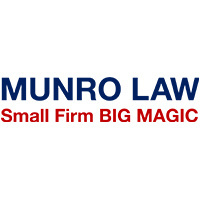 New Market Criminal Lawyers, Virginia
New Market Criminal Lawyers, Virginia
Sponsored Law Firm
-
 x
x

Click For More Info:
-
Tillotson & Martin, LLP
DWI/DUI Defense throughout the Entire Commonwealth of Virginia » view mapCriminal Defense Virginia’s Premier DWI/DUI Defense Firm
Michael C. Tillotson is the one to choose when it comes to DWI/DUI defense in Virginia.
800-878-1431
Sponsored Lawyers
1-10 of 10 matches
Criminal
Criminal Defense & Child Custody are complex cases and require strong effective representation. Munro Law Firm stands ready for you with free consults in criminal cases and a modest fee for Child Custody cases. Small Firm - BIG MAGIC! Call Now & Let's Talk about what we can do for you. Friendly Attorney - No Obligation - No Risk
(more)


 Michael Tillotson Newport News, VA
Michael Tillotson Newport News, VA AboutTillotson & Martin, LLP
AboutTillotson & Martin, LLP Practice AreasExpertise
Practice AreasExpertise

